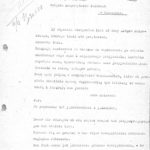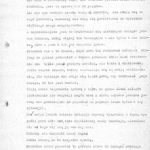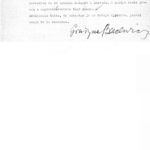“I always show a cheerful expression to people” – this passage from Grażyna Bacewicz’s letter to her brother Vytautas (30 August 1947) became a signature of sorts for the composer’s personality. Used in the title of a biographical film ( “expression” having been replaced with “face” with Wanda Bacewicz’s permission) seems to confirm this trait of the artist’s character, which enabled her to write about herself, not without a touch of self-irony, “I inspire trust” [Znak szczególny (A Distinguishing Mark), Warsaw 1974]. Later on in the story entitled Epilog (Epilogue) the composer tries to solve the mystery of her popularity among people and confesses, “I know how to listen and I speak little”. This however, is not a sufficient argument. Further vivisection leads to questions: “Do I cooperate with the person confiding in me? Am I concerned for them?” These are rare qualities. But Grażyna really seemed to have them, providing evidence of her empathy on many occasions. Here is one example.
After the death of Artur Malawski, she sent a warm letter of condolence to the widow of the composer of Wierchy.She received a grateful reply suggesting that her late husband’s colleagues were not very eager to show some sympathy to Mrs Malawska. This really outraged Grażyna. She considered this to be a manifestation of a lack of human feelings and decided to raise the matter at the next General Assembly of the Polish Composer’s Union.
- Bacewicz’s letter to the Board of the Polish Composers’ Union concerning Malawski’s case, p. 1 (ZKP)
- Bacewicz’s letter to the Board of the Polish Composers’ Union concerning Malawski’s case, p. 2 (ZKP)
- Bacewicz’s letter to the Board of the Polish Composers’ Union concerning Malawski’s case, p. 3 (ZKP)
This trait of her character, openness to others, willingness to help – be it in private or professional matters – is stressed by many other people. Witold Lutosławski talked about it beautifully during a 1989 symposium devoted to Bacewicz held at the headquarters of the Polish Composers’ Union.
Grażyna Bacewicz maintained not only professional but also social relations with many musicians. The repertoire of the Warsaw Quintet, led by Władysław Szpilman, featured both of her Piano Quintets.The second was dedicated by the composer to the ensemble. As Halina Szpilman, widow of the composer and pianist, recalled, Grażyna would sometimes attend the ensemble’s rehearsals, and also visited the Szpilmans’ at home:
This picture may seem too embellished, arousing suspicions that there must be another side to the psyche of this extraordinary woman. This “another side” or, rather, rich personality was discussed by Jan Krenz in a conversation with Elżbieta Markowska. When analysing the late period in her work, Krenz said, “She had a rich and not so simple nature as well as a need to transmit more profound emotions.”
Here are some sentences from Jan Krenz’s portrait of the artist:
The effects of her life are simply extraordinary. She was, of course, very industrious, but also very well organised. She knew how to use time (…). If she got involved in something, she did it authentically, with full devotion. Sometimes famous artists just give their name, while others do the work for them. But it was not Grażyna’s case. She was able to happily combine many activities, achieving good results. She had a smile and cheerfulness for everyone. She never revealed any of her dilemmas, personal problems, which bother us, artists, and which certainly weren’t spared her (…). We both took part in the work of the Warsaw Autumn Programme Committee. I remember that when she spoke during discussions, she was able to present her views in a firm way and implement her plans successfully and with great talent. She was emancipated through and through, her natural traits included personal independence and self-reliance.
Elżbieta Markowska, Jana Krenza pięćdziesiąt lat z batutą. Rozmowy o muzyce polskiej, Kraków, pp. 65 and 67.
The “duality” of Grażyna’s nature was also mentioned by Stefan Kisielewski at the Polish Composers’ Union’s symposium in 1989:
How Grażyna was able to harmoniously combine compositing with “being in the world” can be seen in her letters to her family, especially to her brother Vytautas, who lived in the United States. In them she talks about many problems, worries about illnesses affecting various family members from time to time. Sometimes she complains she feels tired and exhausted. That is why, like any “ordinary human begin”, she enjoyed her holidays, especially those spent in 1960 in Italy with her daughter, thanks to an invitation from her husband’s sister who was married to an Italian. On 23 July she wrote to Vytautas, who was worried about her because Wanda and Kiejstut had informed him of their sister’s extreme exhaustion:
“I’m tough as a horse and I’m not afraid of hardship or exhaustion, and travelling across Italy is no nuisance.”
She explained the extraordinary intensity of her life and ability to cope with many obligations in her characteristic, self-ironic way in one of the stories in theZnak szczególny collection:
Nature – having graciously given me a talent for composition – also gave me something that enables me to cultivate this talent. I have a small, invisible engine thanks to which I can accomplish a task in ten minutes, while others need an hour; thanks to this engine I run and not walk, I can write fifteen letters in half an hour, even my pulse is much faster than in other people, although I was born in the seventh month.
Grażyna Bacewicz, Znak szczególny, Warsaw, 1974, pp. 25–26.
“I always show a cheerful expression to people” – was this declaration an expression of a well-thought-out strategy or emanation of the composer’s true nature? Tadeusz Ochlewski, from 1964 Director of PWM Edition, who was a close friend of Grażyna, decided to make some of their extensive correspondence public after the composer’s death. In one of her letters sent to him on 7 April 1950 Grażyna wrote,
I agree with the theory of determinism. I don’t believe in the free will of humans. Every life, in its every detail, is predicted. Just as we can imagine the past as something real, we could also, if we had a third eye, see the entire course of our lives forward (…). I understand your melancholy, especially given the fact that I’m in a similar mood. Because of different reasons. You are, in fact, an enthusiast of life, while I bear it only on certain conditions… I’m one of the loners, people who are reserved and full of inner inhibitions. My romantic life is limited to experiences of the imagination and fantasies. I walked and cried in the middle of the street, without realising why. I came home smiling, as usual… I can’t agree with your criticism of this duality.
Overcoming her pessimistic determinism, which she shared with her friend, the artist achieved her objective. People around her saw her as a cheerful, internally disciplined person:
I envy you summer, the fact that you can organise everything so wonderfully, that you will go there and will write and will bring up and everything thanks to your magnificent will, talent, character – not by accident but thanks to your extraordinary individuality. And in this, this wonderful ‘normality’ and ‘ordinariness’ of this life: it doesn’t matter whether you just keep up appearances or whether it is really so.
From a letter by Zygmunt Mycielski, 4 July 1953.
An unsolvable mystery, inexplicable duality – we know such cases from literature. But Grażyna Bacewicz was a real person, a woman of flesh and blood, overcoming – despite her inner conviction concerning the inevitability of fate – all obstacles to meet all challenges awaiting her. This is evidenced by her attitude as a long-time Vice President of the Polish Composers’ Union. She cared not only for matters connected with the promotion of Polish music, but also tried to help solve ordinary human problems.
Given the context of Bacewicz’s entire life, her last letter to her brother, written on 20 December 1968 after the visit to Yerevan, is tragic:
Dear Witek, Shortly after my return I went down with flu (I didn’t really lie down, but just didn’t leave the house). I was afraid our house would explode, when I started to sneeze. I know it’s impolite to sneeze loudly, but it was stronger than any considerations. Kiejstut and his wife are to visit us during the holidays. Three days ago they were still complaining, but I ‘explained’ to them over the phone that we might die, so it would be worth seeing each other before that. (Of course, I known we’ll live for many years, it’s a trick to persuade them). My journey (3,500 km one way by plane) wasn’t interesting in any respect. 10 days of my life lost. It seems I can no longer afford that. I’ll be more choosy when it comes to travelling from now on. We already have a mask and costume for Santa Claus, who will ‘come’ to Joasia [Grażyna’s granddaughter – ed.]. Let her have illusions for 2-3 years (…). Don’t get upset, if our letters to you are delayed. It’s just a holiday period gridlock. We, too, will probably have to wait for your letters. Lots of love, Gr.
Grażyna Bacewicz died on 17 January 1969.
People who knew Grażyna Bacewicz remembered her as a warm, open individual, who was nevertheless determined in the pursuit of her goals and consumed by creative passion. The pessimism or dejection revealed in her private correspondence certainly influenced her oeuvre, especially her middle and late works. But they did not prevent her from finding fulfilment in what constituted the composer’s “ostinato of life”, as Stefan Kisielewski described her incessant musical vitality.


